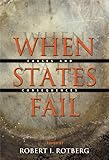When States Fail : Causes and Consequences / ed. by Robert I. Rotberg.
Material type: TextPublisher: Princeton, NJ : Princeton University Press, [2010]Copyright date: ©2004Edition: Course BookDescription: 1 online resource (352 p.) : 1 line illus. 8 tablesContent type:
TextPublisher: Princeton, NJ : Princeton University Press, [2010]Copyright date: ©2004Edition: Course BookDescription: 1 online resource (352 p.) : 1 line illus. 8 tablesContent type: - 9780691116716
- 9781400835799
- 320/.01/1 22
- online - DeGruyter
- Issued also in print.
| Item type | Current library | Call number | URL | Status | Notes | Barcode | |
|---|---|---|---|---|---|---|---|
 eBook
eBook
|
Biblioteca "Angelicum" Pont. Univ. S.Tommaso d'Aquino Nuvola online | online - DeGruyter (Browse shelf(Opens below)) | Online access | Not for loan (Accesso limitato) | Accesso per gli utenti autorizzati / Access for authorized users | (dgr)9781400835799 |
Frontmatter -- Contents -- List of Maps -- Preface -- One. The Failure and Collapse of Nation-States: Breakdown, Prevention, and Repair -- PART ONE: THE CAUSES AND PREVENTION OF FAILURE -- Two. Domestic Anarchy, Security Dilemmas, and Violent Predation: Causes of Failure -- Three. The Global-Local Politics of State Decay -- Four. The Economic Correlates of State Failure: Taxes, Foreign Aid, and Policies -- Five. The Deadly Connection: Paramilitary Bands, Small Arms Diffusion, and State Failure -- Six. Preventing State Failure -- PART TWO: POST-FAILURE RESUSCITATION OF NATION-STATES -- Seven. Forming States after Failure -- Eight. Disarmament, Demobilization, and Reintegration: Lessons and Liabilities in Reconstruction -- Nine. Establishing the Rule of Law -- Ten. Building Effective Trust in the Aftermath of Severe Conflict -- Eleven. Civil Society and the Reconstruction of Failed States -- Twelve. Restoring Economic Functioning in Failed States -- Thirteen. Transforming the Institutions of War: Postconflict Elections and the Reconstruction of Failed States -- Fourteen. Let Them Fail: State Failure in Theory and Practice: Implications for Policy -- Contributors -- Index
restricted access online access with authorization star
http://purl.org/coar/access_right/c_16ec
Since 1990, more than 10 million people have been killed in the civil wars of failed states, and hundreds of millions more have been deprived of fundamental rights. The threat of terrorism has only heightened the problem posed by failed states. When States Fail is the first book to examine how and why states decay and what, if anything, can be done to prevent them from collapsing. It defines and categorizes strong, weak, failing, and collapsed nation-states according to political, social, and economic criteria. And it offers a comprehensive recipe for their reconstruction. The book comprises fourteen essays by leading scholars and practitioners who help structure this disparate field of research, provide useful empirical descriptions, and offer policy recommendations. Robert Rotberg's substantial opening chapter sets out a theory and taxonomy of state failure. It is followed by two sets of chapters, the first on the nature and correlates of failure, the second on methods of preventing state failure and reconstructing those states that do fail. Economic jump-starting, legal refurbishing, elections, the demobilizing of ex-combatants, and civil society are among the many topics discussed. All of the essays are previously unpublished. In addition to Rotberg, the contributors include David Carment, Christopher Clapham, Nat J. Colletta, Jeffrey Herbst, Nelson Kasfir, Michael T. Klare, Markus Kostner, Terrence Lyons, Jens Meierhenrich, Daniel N. Posner, Susan Rose-Ackerman, Donald R. Snodgrass, Nicolas van de Walle, Jennifer A. Widner, and Ingo Wiederhofer.
Issued also in print.
Mode of access: Internet via World Wide Web.
In English.
Description based on online resource; title from PDF title page (publisher's Web site, viewed 30. Aug 2021)


